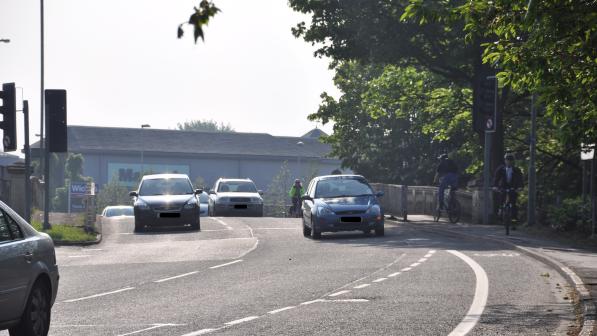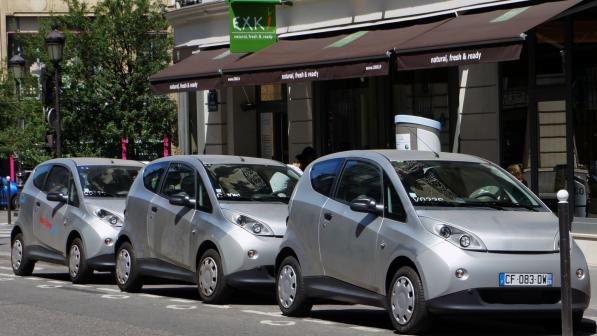We need traffic reduction, not technofixes, to solve our pollution crisis

Cycling UK has told the Government that it needs to embrace cycling and other clean and healthy travel options, rather than relying on technofixes, in order to tackle Britain's pollution crisis.
In its response to the Government's consultation on its latest draft Clean Air Strategy, Cycling UK says:
"The draft strategy’s response to road transport emissions relies almost entirely on replacing diesel engines with hybrid or electric engines." It urges the Government "to give far greater weight to the wider health, congestion-reduction, road safety and quality of life benefits of aiming for overall reductions in road traffic, rather than simply for cleaner traffic," adding that "We need fewer cars, not just newer cars".
Cycling UK's response calls for a strengthened strategy which:
- Focuses on the impacts of pollution, not just the volumes of pollutants;
- Aims for fewer cars, not just newer cars;
- Supports local road user charging schemes, alongside a targeted national scrappage scheme for dirty diesels, funded by revenues from Vehicle Excise Duty (VED);
- Rebalances overall transport spending to allow significantly increased investment in the Government’s Cycling and Walking Investment Strategy (CWIS);
- Supports the uptake of e-bikes;
- Positively promotes cycling through public awareness campaigns on responding to pollution, while tackling two myths (on the overall health benefits of cycling, and the justification for main-road cycle provision) that could otherwise impede this aim;
- Commits to new clean air legislation, reflecting the idea of air quality as a human right, and incorporating updated powers and duties from the existing Traffic Reduction Acts.
The Government's latest draft Clean Air Strategy follows two previous attempts to adopt policies to tackle air pollution in the UK. Both were subject to successful legal challenges by the environmental law firm Client Earth, as was a subsequent plan focused specifically on tackling roadside emissions of nitrogen dioxide (NO2). This is the one pollutant for which the UK, in common with other European countries, is still in breach of its legal limits. Pollution is estimated to shorten around 40,000 lives every year.
Cycling UK believes the latest strategy is simply attempting to deflect attention onto other sources of pollution besides road transport, due to the Government's persistent unwillingness to reduce motor traffic volumes and promote clean and healthy alternatives, such as cycling.
The Government seems especially reluctant to support councils in adopting local road user charging schemes, even though its own evidence shows that this would be the most effective way to achieve compliance with air quality standards.
Although Cycling UK also supports action to replace diesel and petrol engines with electric power, it points out that this would not tackle the related problems of congestion, road danger and physical inactivity associated with excess car use. Nor would it avoid the creation of small pollutant particles, known as PM2.5, due from wear-and-tear of brakes and tyres as well as from diesel engines.
Charging would also provide councils with much-needed funding to invest in improved provision for cycling and other non-car alternatives. However Cycling UK also believes the Government needs to shift the balance of overall transport funding away from its excessive £15bn Road Investment Strategy (RIS), and instead to strengthen its seriously-underfunded Cycling and Walking Investment Strategy (CWIS),
The Government claims the CWIS included £1.2bn of funding which "may" be spent on cycling and walking over the same 5-year period as the RIS (2015-2020). However only £0.3bn of this is specifically earmarked by central government for cycling and walking. The rest is expected to come from local authorities and other sources.
Cycling UK recognises however that road user charging could be an unfair burden on those who have bought diesel cars in the (misguided) belief that they were environmentally preferable, and lower income groups who can ill afford either to upgrade their old diesel cars or to pay pollution-based charges. Cycling UK therefore supports calls for a targeted 'scrappage' scheme to support a switch to cleaner transport. However such a scheme should also enable people to switch to electric bicycles or 'e-bikes'.
Cycling UK's responses says: "[It] makes no sense that the Government’s Office for Low Emissions Vehicles (OLEV) provides generous subsidies for the uptake of electric cars and vans, but no support whatsoever for e-bikes." It adds that supporting e-bikes should also be part of the Government's Industrial and Clean Growth Strategies, which complement the Clean Air Strategy.
Cycling UK also supports calls for a new Clean Air Act, to ensure that the UK's air pollution standards following Brexit, and the means of enforcing them, are at least as strong as at present, and preferably stronger. The charity also calls for the provisions of the two Traffic Reduction Acts to be updated and incorporated into any new legislation on clean air.
Air pollution kills, while cycling saves lives. The Government needs to stop placing all its faith in technofix solutions, and instead provide wholehearted support for cycling.
Roger Geffen, Cycling UK Policy Director
Commenting on the response, Cycling UK's Policy Director Roger Geffen said:
"Air pollution kills, while cycling saves lives.The Government needs to stop placing all its faith in technofix solutions, and instead provide wholehearted support for cycling. The benefits wouldn't just be cleaner air, but also safer and less congested streets, reduced healthcare costs and a better quality of life for all."
You can download Cycling UK's full response to the Clean Air consultation or a 3-page summary. For further information on these issues, see Cycling UK's briefings on Cycling and Air Pollution and on Health.




